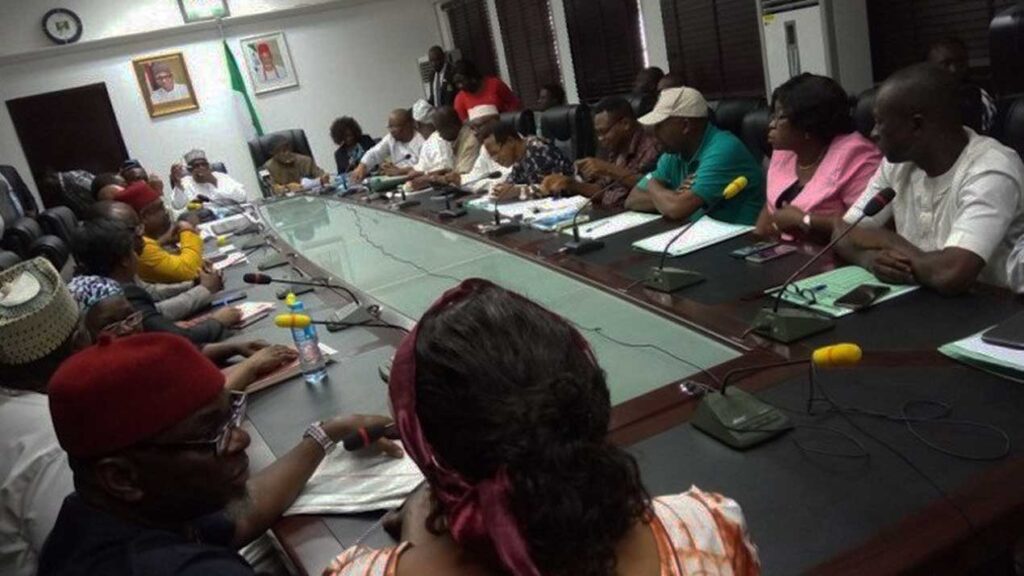
Scholarship programmes in the country have been squirming in a mire of controversies, occasioned by underhand dealings, which are allegedly gaining ascendancy. Ranging from calls for the stoppage of the 2015/2016 Presidential Special Scholarship for Innovation and Development (PRESSID) on the grounds that it was designed to favour some sections of the country, to the description of the Rivers State Governor’s Overseas Scholarship Scheme, initiated by Rotimi Amaechi, as a scam by incumbent, Nyesome Wike, it is becoming obvious that some of these scholarship schemes need to be reviewed to ensure relevance and maintain standards, writes ENO-ABASI SUNDAY
POLITICALLY, there is no love lost between Governor Ezenwo Nyesom Wike, of Rivers State and his predecessor in office, Rotimi Chibuike Amaechi. In the last three years or thereabouts, both characters, who are key dramatis personae in the ongoing Rivers State power play, have been locked in an acrimonious verbal jousting.
Even though Wike, a former chief of staff to the latter defeated the anointed candidate of his erstwhile principal to emerge governor of the state, the acrimony between the duo has only been exacerbated rather than abate. Rivers State Governor’s Overseas Scholarship Scheme, a scam As the battle for political supremacy rages on Wike, a former minister of state for education has fired several salvoes the way of Amaechi.
One of them being Wike’s outright declaration that from the report he has obtained, the Rivers State Governor’s Overseas Scholarship Scheme, initiated by the out gone Rotimi Amaechi-led administration was a scam.
While speaking in Port Harcourt recently, Wike claimed that the report presented to him by his transition committee revealed that the past administration sidelined the state scholarship board and appropriated its powers to award scholarships to the Rivers State Sustainable Development Agency (RSSDA), which resorted to the use of consultants to source for overseas scholarship for beneficiaries of the scheme. “From the report I have gotten, it is a scam.
The governor queried, “Why do you do it through consultants when you have the scholarship board? He added, “From the report I received, if N2b were to be the fee, N900m was paid as fee to the consultant. This is a scam. It is a scam. Any money for scholarship must pass through the scholarship board.
He continued, “Why did you establish a scholarship board only to abandon a government-established agency to be dealing with consultants? It is not acceptable.
There is no way I can continue with that. That is not a good policy. So anything that has to do with scholarship will move back to the scholarship board.
That is the way it is supposed to be.” The governor who said he had observed that the scholarship scheme was highly politicised by the past government to score cheap political mileage, wondered why a state government would send people overseas to study when it lacks the resources to sustain them. “We must do something based on reality.
Can we do this? Do we have the resources to do this now? If we don’t have, can we please tell our people the simple truth that this is not feasible now? Everybody will want to give scholarship, but you cannot give scholarship when you do not have the resources. You cannot give scholarship for beneficiaries to go overseas when you know you cannot pay their fees. We must tell our people the truth.
However, we will continue to pay the funds in order to stop the suffering of our boys and girls overseas. But the issue of scholarship must go back to where it belongs and that is the scholarship board. Why should RSSDA be the one running scholarship for us? Why?” Wike questioned.
In recent times, the award of scholarship by mostly state and federal governments has been shrouded in immense controversy as managers of the respective schemes have been accused of a litany of abuses prominent among which are favouritism and nepotism.
Simply defined, scholarship is sometimes used to describe any financial aid given to a student that does not have to be repaid. According to some authorities, a scholarship is given to a student because of a reason: the student has qualified for, or won it by academic or athletic ability, or by agreeing to follow a particular career, or has some special ethnic or other characteristics.
Scholarships are not given for financial needs alone. But over time and in various set-ups in the Nigerian society, some managers of the schemes have so bastardise the process that dullards or highly unqualified persons end up benefiting from the schemes, which ought to be merit-based, while the qualified ones are left in the lurch.
Put differently, scholarship processes are now subjected to the whims and caprices of mundane considerations, to the extent that merit has been downgraded and excellence overthrown, while favouritism, nepotism and sundry factors now reign supreme as basis for scholarship awards.
Calls for stoppage of PRESSID In the dying days of the Goodluck Jonathan-led administration, 76 males and 28 females qualified to study for their masters and doctorate degrees in some of the 25 best universities in the world. Shortly after that, the House of Representatives Committee on Education (of the Seventh Assembly) asked the Federal Government to stop the 2015/2016 PRESSID on grounds that the scheme was designed to favour some sections of the country to the exclusion of others.
The scheme was introduced following the discovery that less than 40 per cent of lecturers in the university system had doctorate degrees. It was also to produce a critical mass of individuals to develop Nigeria in the area of innovation and development.
The committee, which was chaired by a lawmaker from Kano State, Mr. Aminu Sulaiman, met with the Chairman of the Implementation Committee, Prof. Julius Okojie, on the issue and it turned out to be a heated debate. That was the second time the committee was calling for the stoppage since it started investigating the criteria for the award of the scholarships. Suleiman had claimed that claimed that northerners were sidelined in the awards, leading to what he called “education imbalance and monumental abuse.”
On that occasion, Okojie had insisted that no considerations other than “merit,” qualified the beneficiaries for the awards. Okojie added, “Unless we are saying that the criteria have to change, I will not advise that the programme should be scrapped.”
He thereafter assured the lawmakers that he would pass their position to President Jonathan. Swiftly, erstwhile supervising Minister for Education, Nyesom Wike, joined Okogie in stressing that the selection process was based purely on merit, insisting that the process that produced the beneficiaries was rigorous, transparent and thorough.
He said if federal character had been followed, as was clamoured for by some people, many of the country’s top brains would have missed out from developing themselves and the country at large.
Beware of fraudsters Though not a tacit confirmation of the lawmakers’ fears about the spread of beneficiaries of PRESSID, the Federal Government recently warned Nigerians against fraudulent persons parading themselves as Federal Scholarship Board officials, who are out to defraud unsuspecting applicants and scholars.
Permanent Secretary, Federal Ministry of Education, Dr. MacJohn Nwaobiala, who spoke at a news conference in Abuja last week said that fraudulent persons were contacting federal scholarship applicants or scholars through telephone calls and text messages, demanding payment of money into some bank accounts before their scholarships could be processed.
Though he said no culprits had been apprehended, Nwaobiala informed that the development has been reported to law enforcement agents “for investigation to bring the perpetrators to book.” He stressed that no payment was required for scholarship awards, which are usually advertised in the national media.
“If a candidate is not selected under national merit, state equity or other criteria, there are no agents that would be paid to make the admission possible. Please be mindful of admission racketeers.
“The public is hereby informed that these fraudulent persons have no relationship with the Federal Ministry of Education and Federal Scholarship Board…”










